Kazakhstan profile - Timeline
- Published
A chronology of key events:
1st-8th centuries - Turkic-speaking and Mongol tribes invade and settle in what is now Kazakhstan and Central Asia.
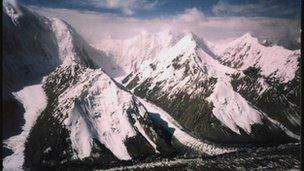
The Tien Shan mountains, Kazakhstan
8th century - Arab invaders introduce Islam.
1219-24 - Mongol tribes led by Genghis Khan invade Kazakhstan and Central Asia. Later they become assimilated by Turkic tribes that make up the majority in their empire.
Late 15th century - With the formation of the Kazakh khanate, the Kazakhs emerge as a distinct ethnic group.
Early 17th century - Kazakhs split into three tribal unions, the Elder, Middle and Lesser Zhuzes, or Hordes, which were led by Khans.
Russian domination
1731-42 - The Khans of the three Zhuzes formally join Russia in pursuit of protection from invasions from the east by the Mongols.
1822-68 - Despite many uprisings, Tsarist Russia retains control over the Kazakh tribes, deposing the Khans.
1868-1916 - Thousands of Russian and Ukrainian peasants are brought in to settle Kazakh lands; first industrial enterprises set up.
1916 - A major anti-Russian rebellion is repressed, with about 150,000 people killed and more than 300,000 fleeing abroad.
1917 - Civil war breaks out following the Bolshevik revolution in Russia.
Soviet rule
1920 - Kazakhstan becomes an autonomous republic of the USSR. Until 1925 it is called the Kyrgyz Autonomous Province to distinguish its people from the Cossacks.
Late 1920s-1930s - Intensive industrialisation and collectivisation of agriculture. More than 1 million people die from starvation as a result of the campaign to settle nomadic Kazakhs and collectivise agriculture.
1936 - Kazakhstan becomes a full union republic of the USSR.
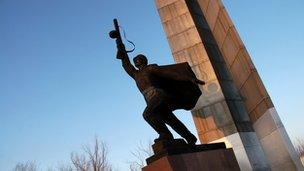
A statue in Kurchatov - hundreds of nuclear tests were carried out in the area during Soviet times
1940s - Hundreds of thousands of Koreans, Crimean Tatars, Germans and others forcibly moved to Kazakhstan.
1949 - The first nuclear test explosion is carried out at the Semipalatinsk nuclear test ground in eastern Kazakhstan.
1954-62 - About two million people, mainly Russians, move to Kazakhstan during the campaign to develop virgin lands launched by Soviet leader Nikita Khrushchev; the proportion of ethnic Kazakhs in the republic drops to 30%.
1961 - The first manned spacecraft launched from the Baikonur space launch site in central Kazakhstan.
Anti-Soviet stirrings
1986 - About 3,000 people take part in protests in Almaty after Soviet leader Mikhail Gorbachev appoints Gennadiy Kolbin, an ethnic Russian, head of the Communist Party of Kazakhstan (CPK), replacing Dinmukhamed Kunayev, an ethnic Kazakh.
1989 - Nursultan Nazarbayev, an ethnic Kazakh, becomes head of the CPK; parliament adopts a new law on language, proclaiming Kazakh the state language and Russian a language of inter-ethnic communication.
1990 - The Supreme Soviet elects Nursultan Nazarbayev first Kazakh president and on 25 October declares state sovereignty.
1991 August - President Nazarbayev condemns the attempted anti-Gorbachev coup in Moscow; the CPK withdraws from the Communist Party of the Soviet Union; Nazarbayev signs a decree on closing the Semipalatinsk nuclear test ground.
Independence
1991 December - Nursultan Nazarbayev wins uncontested presidential elections; Kazakhstan declares independence from the Soviet Union and joins the Commonwealth of Independent States (CIS).
1992 - Kazakhstan admitted into the United Nations and the Conference on Security and Cooperation in Europe, the predecessor of the Organisation for Security and Cooperation in Europe (OSCE).
1993 - A new constitution increasing presidential powers is adopted; a major privatisation programme is launched; Kazakhstan ratifies the first Strategic Arms Reduction Treaty and the Treaty on the Non-Proliferation of Nuclear Weapons.
1995 - Kazakhstan signs economic and military cooperation pact with Russia; nuclear-free status is obtained; President Nazarbayev's term in office is extended until December 2000 and a new constitution adopted by national referendum.
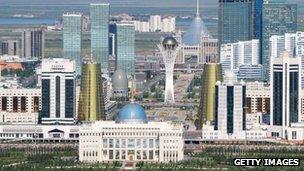
Kazakhstan's new capital Astana was known as Akmola until 1998
1997 - Major oil agreements secured with China. The Kazakh capital is moved from Almaty in the south to Akmola (formerly Tselinograd) in the north.
1998 - New capital is renamed Astana. Constitution amended, extending president's term in office from five to seven years and removing upper age limit for president.
1999 - Nursultan Nazarbayev re-elected president after main rival, former PM Akezhan Kazhegeldin, barred from standing. Subsequent parliamentary elections criticised by OSCE for irregularities.
Separatist plot by ethnic Russians in north east Kazakhstan fails.
2000 - Economic Security Strategy up to 2010 is adopted. World Bank praises economic reforms. Kazakhstan beefs up security on all borders following incursions by Islamist militants in Kyrgyzstan and Uzbekistan; clampdown on Uighurs after shoot-out in Almaty.
2001 - First major pipeline for transporting oil from Caspian to world markets opens in March, running from huge Tengiz oil field in western Kazakhstan to Russian Black Sea port of Novorossiysk.
2001 June - Kazakhstan joins China, Russia, Kyrgyzstan, Uzbekistan and Tajikistan in launching the Shanghai Cooperation Organisation (SCO) which aims to fighting ethnic and religious militancy and to promote trade.
2001 November - President Nazarbayev purges government of officials accused of joining newly-formed Democratic Choice reform movement.
2001 December - President Nazarbayev, US President George W Bush meet, declare commitment to long-term, strategic partnership.
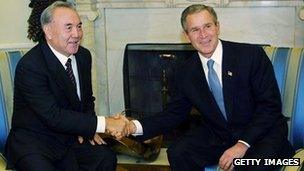
President Nazarbayev and former US President George W Bush in 2001
2002 January - President Nazarbayev appoints Imangali Tasmagambetov as prime minister to replace Kasymzhomart Tokayev, who quit abruptly.
2002 July - Democratic Choice co-founder and ex-energy minister Mukhtar Ablyazov jailed for alleged abuse of office.
2002 August - Opposition figure Galymzhan Zhakiyanov, co-founder of Democratic Choice movement and critic of President Nazarbayev, is jailed for alleged abuse of office as regional governor.
2003 January - Journalist and Nazarbayev critic Sergey Duvanov found guilty of raping minor and jailed. Rights groups say trial was flawed and an attempt to silence media criticism of president. He is later released on probation after serving a year of his three and a half year sentence.
2003 May - Jailed opposition leader Mukhtar Ablyazov pardoned and released.
2003 June - Prime Minister Tasmagambetov resigns over proposed land reform bill. Daniyal Akhmetov replaces him. Bill, allowing private ownership of land, is passed.
2003 December - President Nazarbayev announces moratorium on death penalty
Oil to China
2004 May - Deal signed with China on construction of oil pipeline to Chinese border.
2004 September/October - President Nazarbayev retains control over lower house of parliament as his Otan party wins majority of seats in elections which international observers criticise as flawed.
Parliament speaker Zharmakhan Tuyakbay resigns in protest at conduct of voting.
2005 January - Court orders dissolution of Democratic Choice, one of the country's main opposition parties. The party is accused of breaching state security by calling on supporters to protest against parliamentary election results.
2005 March - Opposition groups join together to form For A Just Kazakhstan movement led by Zharmakhan Tuyakbay.
2005 November - Opposition figure Zamanbek Nurkadilov, a vocal critic of President Nazarbayev, found shot dead at his home.
2004 August - Jailed opposition figure Galymzhan Zhakiyanov released from prison two years into seven-year sentence and sent into internal exile.
2005 December - Nursultan Nazarbayev returned for further term as president with more than 90% of vote. Western observers say poll flawed.
President Nazarbayev inaugurates a 1,000-km (620 mile) pipeline to carry oil to western China.
2006 January - Opposition leader Galymzhan Zhakiyanov returns home to Almaty from internal exile after being released on parole.
2006 February - Opposition figure Altynbek Sarsenbaiuly, his bodyguard and driver are found shot dead outside Almaty.
2007 January - Prime Minister Daniyal Akhmetov resigns, giving no reason for his move. He is replaced by former deputy premier Karim Masimov.
2007 May - Parliament votes to allow President Nazarbayev to stay in office for an unlimited number of terms.
Mr Nazarbayev fires son-in-law Rakhat Aliyev in an apparent power struggle.
2007 August - Trial of 30 alleged Islamists accused of belonging to the banned group Hizb ut-Tahrir, which advocates the setting up of an Islamic state across Central Asia.
2007 August - Elections hand President Nazarbayev's Nur-Otan party all seats in the lower house of parliament. Observers say the conduct of the vote improved since the last election, but still did not meet international standards of fairness.
2008 March - President Nazarbayev's exiled former son-in-law, Rakhat Aliyev, is sentenced to 20 years imprisonment in absentia after being found guilty of plotting a coup. Aliyev denies the charges, saying they are politically motivated.
2009 April - President Nazarbayev announces his readiness to build a nuclear fuel bank to ensure other countries do not need to develop their own fuel. Idea first proposed by the International Atomic Energy Agency in 2005, and supported by both the United States and Russia.
2009 June - A law tightens control over the internet by ruling that chat rooms, blogs and public forums count as mass media. This means a blogger could break the law by expressing a view.
2009 October - A court rejects an appeal by prominent human rights activist Yevgeny Zhovtis against a manslaughter conviction stemming from a car accident. Mr Zhovtis and rights groups said he had not been given a fair trial.
France and Kazakhstan sign energy and business deals worth $6bn during a visit by President Nicolas Sarkozy. Kazakhstan also agreed to allow French military supplies to pass through on their way to Afghanistan.
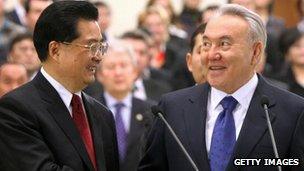
China and Kazakhstan cooperated over a natural gas pipeline which opened in 2009
2009 December - Chinese President Hu Jintao and President Nazarbayev unveil the Kazakh section of a natural gas pipeline joining Central Asia to China.
2010 January - Kazakhstan becomes the first former Soviet state to chair the Organisation of Security and Co-operation in Europe (OSCE) security and rights group, despite criticism of its own democratic credentials. President Nazarbayev signals a change in emphasis from rights to security.
2010 February - A court overturns an earlier ruling that banned the media from publishing criticism of President Nazarbayev's son-in-law Timur Kulibayev. The OSCE had criticised the ban.
More powers for president
2010 May - Parliament approves a bill granting more powers to President Nazarbayev, granting him the title of "leader of the nation" and immunity from prosecution.
2010 July - A customs union between Russia, Belarus and Kazakhstan comes into force after Belarus ratifies a key customs code.
2011 February - President Nazarbayev calls early presidential election, after a planned referendum on allowing him to stay on unopposed until 2020 is ruled unconstitutional.
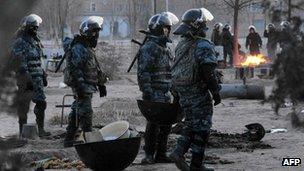
Zhanaozen, site of clashes between striking workers and police in 2011, is an oil-rich town
2011 April - President Nazarbayev wins re-election in a poll boycotted by the opposition.
2011 December - Clashes between striking workers and police in western oil town of Zhanaozen leave 16 people dead. The government declares a state of emergency.
2012 January - Parliamentary elections, which international monitors say fail to meet basic democratic principles.
2012 October - Vladimir Kozlov, leader of an unofficial Alga opposition party, is jailed for seven and a half years after being found guilty of "attempting to overthrow the government" in an alleged plot with exiled politician and businessman Mukhtar Ablyazov. The authorities accuse Mr Kozlov of inciting violence during the Zhanaozen protests in December. Mr Kozlov says the sentence is politically motivated.
2013 June - David Cameron becomes the first serving British Prime Minister to pay an official visit to Kazakhstan. The UK is the third largest investor in the oil-rich central Asian nation.
2013 July - Amnesty International accuses President Nazarbeyev of making false promises to the international community about eradicating torture, and says the Kazakh security services carry out torture with impunity.
2014 January - A French court approves the extradition of Kazakh tycoon and dissident Mukhtar Ablyazov, accused of massive fraud, to Russia or Ukraine. Ablyazov is accused of stealing billions of dollars from the Kazakh BTA Bank, which also operates in Russia and Ukraine. He denies the charges and says he will appeal.
2014 May - Russia, Kazahkstan and Belarus sign an agreement creating an economic union. The Eurasian Economic Union aims to create a shared market and integrate economic policy across the three former Soviet countries.
2015 January - Eurasian Economic Union between Russia, Kazahkstan and Belarus comes into force.
2015 February - Kazakhstan's former ambassador to Austria, Rakhat Aliyev, is found dead in a prison cell in Vienna.
2015 April - President Nazarbayev is re-elected with 97.7 per cent of votes cast. Opposition parties did not field any candidates and the two other contenders were widely seen as pro-government.
2015 May - Authorities say about one-third of the endangered saiga antelope population - as many as 85,000 animals - has mysteriously died over the space of a several days possibly by a bacterial infection.
2015 August - Kazakhstan's currency, the Tenge, plunges in value by more than a third in one day precipitated by the government floating the currency after spending 28 billion US dollars propping it up.
An agreement is signed to create the world's first bank of low-enriched uranium in the northeast of Kazakhstan. The bank will be managed by the International Atomic Energy Agency (IAEA).
2015 September - President Nazarbayev appoints his daughter, Dariga, as deputy prime minister in a move linked to possible succession planning.
2015 December - Former Prime Minister Serik Akhmetov is sentenced to 10 years in prison for corruption including abuse of office and embezzlement of state funds.
2016 March - The government bans the use of mobile devices in government buildings - including smartphones, tablets and smart watches following cases of confidential information being leaked through the mobile messenger WhatsApp.
2016 April - Kazakhstan enacts a law allowing for the use of chemical castration on convicted paedophiles, after authorities report a 50 per cent on 2015.
2016 May - Police arrest dozens of anti-government protesters after they hold rallies against controversial land reforms.
2016 August - Vladimir Kozlov, the leader of an unofficial opposition party, is released four years into a seven and half-year prison sentence on charges of attempting to overthrow the government.
2016 December - France blocks the extradition to Russia of Kazakh banker, former energy minister and opposition figure Mukhtar Ablyazov, who is accused of embezzling up to six billion dollars.
Nazarbayev era ends
2017 March - Parliament approves constitutional reforms that will reduce the president's powers in favour of lawmakers and the cabinet.
2018 May - Parliament appoints President Nazarbayev chairman for life of a newly-strengthened Security Council, preparing the stage for his post-presidential role.
2019 March - President Nazarbayev announces his resignation.
2019 April - President Kassym-Jomart Tokayev, the former Senate chairman, announces snap presidential elections for 9 June.